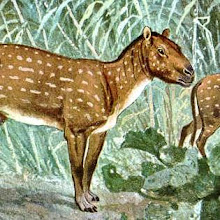
Weidehopf
If you don't know what these mean, they are referred to as the bittern and the hoopoe in English, respectively. If you're wondering why I put this in the "Märchen" category, it is because this story attempts to explain how these birds got their calls... By the way, I know the bittern is not the exact species being referred to, possibly the hoopoe as well, but I got them from the general grouping area in Wikipedia.
'Wo weidet Ihr Eure Herde am liebsten?' fragte einer einen alten Kuhhirten. 'Hier, Herr, wo das Gras nicht zu fett ist und nicht zu mager; es tut sonst kein gut.' 'Warum nicht?' fragte der Herr. 'Hört Ihr dort von der Wiese her den dumpfen Ruf?' antwortete der Hirt, 'das ist der Rohrdommel, der war sonst ein Hirte, und der Wiedehopf war es auch. Ich will Euch die Geschichte erzählen.
Der Rohrdommel hütete seine Herde auf fetten grünen Wiesen, wo Blumen im Überfluß standen, davon wurden seine Kühe mutig und wild. Der Wiedehopf aber trieb das Vieh auf hohe dürre Berge, wo der Wind mit dem Sand spielt, und seine Kühe wurden mager und kamen nicht zu Kräften. Wenn es Abend war und die Hirten heimwärts trieben, konnte Rohrdommel seine Kühe nicht zusammenbringen, sie waren übermütig und sprangen ihm davon. Er rief 'bunt, herüm, (bunte Kuh, herum), doch vergebens, sie hörten nicht auf seinen Ruf. Wiedehopf aber konnte sein Vieh nicht auf die Beine bringen, so matt und kraftlos war es geworden. 'Up, up, up!, schrie er, aber es half nicht, sie blieben auf dem Sand liegen. So gehts, wenn man kein Maß hält. Noch heute, wo sie keine Herde mehr hüten, schreit Rohrdommel 'bunt, herüm,' und der Wiedehopf 'up, up, up!'
Where do you like best to feed your flocks, said a man to an old cowherd. Here, sir, where the grass is neither too rich nor too poor, or else it is no use. Why not, asked the man. Do you hear that melancholy cry from the meadow there, answered the cowherd, that is the bittern. He was once a cowherd, and so was the hoopoe also, I will tell you the story. The bittern pastured his flocks on rich green meadows where flowers grew in abundance, so his cows became wild and unmanageable. The hoopoe drove his cattle on to high barren hills, where the wind plays with the sand, and his cows became thin, and got no strength. When it was evening, and the cowherds wanted to drive their cows homewards, the bittern could not get his together again. They were too high-spirited, and ran away from him. He called, come, cows, come, but it was of no use. They took no notice of his calling. The hoopoe, however, could not even get his cows up on their legs, so faint and weak had they become. Up, up, up, screamed he, but it was in vain, they remained lying on the sand. That is the way when one has no moderation. And to this day, though they have no flocks now to watch, the bittern cries, come, cows, come, and the hoopoe, up, up, up.
There it was. I find it a little surprising that the hoopoe knows English, but...
Anyway, I don't have the exact species for reference, but I have heard the American Bittern call, and it sounds quite similar to the onomatopoeia given here, I don't have a point of reference for the Hoopoe, though.
Translation from http://www.familymanagement.com/literacy/grimms/grimms195.html


No comments:
Post a Comment